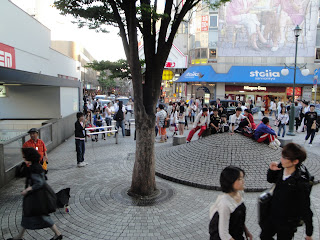 Every night that you go to Sannomiya in Kobe, no matter what night of the week it is, you are guaranteed to see someone performing music. The local buskers don't usually have permits or any kind of permission to perform where they do, and usually get a visit from local police who stop the shows. Sometimes it's just an acoustic guitar and a microphone; at its most impressive it's a full four-piece band with amps and drums and everything; at its most pitiful and embarrassing it's a guy with a microphone and an iPod, struggling to make some kind of impression from his vocals over the muffled instrumental pumping from the speakers (see man with mic in picture below).
Every night that you go to Sannomiya in Kobe, no matter what night of the week it is, you are guaranteed to see someone performing music. The local buskers don't usually have permits or any kind of permission to perform where they do, and usually get a visit from local police who stop the shows. Sometimes it's just an acoustic guitar and a microphone; at its most impressive it's a full four-piece band with amps and drums and everything; at its most pitiful and embarrassing it's a guy with a microphone and an iPod, struggling to make some kind of impression from his vocals over the muffled instrumental pumping from the speakers (see man with mic in picture below).
In Kobe, the most frequently occupied area to perform music is in the above picture, a park outside the Sannomiya subway station dubbed by my peers as "Paiyama" (I can only assume, as it's written パイ山, literally meaning 'breast mountain', that the literal meaning holds the same). This area is a popular meeting place for Japanese people and various foreigners, and always has somebody around for the musicians to play for. The usual performers are acoustic guitar-players, usually doing covers or playing original songs that might as well be covers of Japanese pop-folk acts like Yuzu ( http://en.wikipedia.org/wiki/Yuzu_(band) ). They generally fail to leave a significant impression, but I always make sure to cheer, clap, and show them support when I'm in their vicinity, even if they suck, it makes it all that more important to spare their unconfident public performing (and most of the time the buskers reek of being unconfident).
Often times they will have recordings of their music for sale; now, I sell my debut album in Japan at about 600 yen per CD. This is with professional printing, 13 songs, over an hour of music and everything. Many street artists in Japan sell their 2-8 track demos for a thousand yen, about ten dollars, on burnt CD-R discs with shabbily (or sometimes creatively cute) CD cover slips. If I am generous or take a liking to the music I will pay the steep fees that they charge. The quality of their sound recording and mastering, too, leaves a lot to be desired for the price you pay. It can't really be helped, because they are amateurs and recording is expensive in Japan, but I can't help but feel these street artists would leave a bigger impact if they took a loss on their recordings and sold their records cheaply or, as the smarter and usually more prominent street artists do, give demos for free. In underground music it's a certain taboo to try to sell your record right off the bat. Trying to turn a profit when still playing sometimes shoddy sets on the street is a sure-fire ticket to nowhere, especially in a music industry as rigid and steep as Japan's.
And so I also wonder what they possibly hope to accomplish by putting their hearts and souls into street busking. Not many of them stand out, and the ones who do stand out are still following a formula and may not have that special edge to break into the industry. From some of the musicians that I have spoken to, mostly young college-aged kids, they do it for fun. Others who put loads of effort into their self-advertising seem to really be interested in making a career of music. The sad fact is that a lot of them won't go anywhere. Playing the Westernized style of music that they do, and following a Westernized romantic notion of following one's dream, the ones who lack talent and originality, and for the Japanese record industry, most importantly, good looks and a flashy image, they will probably not succeed in performing music. Knowing how Japanese society functions, it's a somber truth that many of these performers are probably aware of. And yet, in the night, you can always find them, ceaselessly performing until some party-crasher calls the police to quiet down the desperation of their noise.

No comments:
Post a Comment